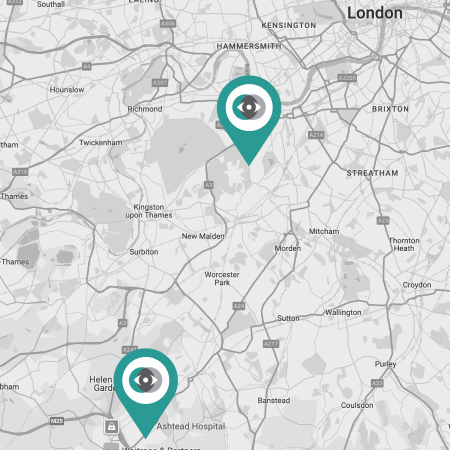
The role of nutrition and lifestyle factors in cataract prevention and management
As an eye care professional committed to promoting eye health and well-being, it's essential to recognise that cataracts, a common age-related eye condition, can often be influenced by lifestyle and dietary choices. While surgical intervention is effective in treating cataracts, there is a growing body of evidence that adopting a healthy lifestyle and nutrition plan may contribute to both prevention and improved management of cataracts.
Understanding cataracts:
Cataracts develop when the natural lens of the eye becomes cloudy, leading to blurred vision and, if left untreated, eventual blindness. The aging process is a significant factor, but other elements, such as genetics, smoking, and exposure to ultraviolet (UV) radiation, can accelerate their formation.
The link between nutrition and cataract prevention:
Antioxidant-rich diet:
Including antioxidant-rich foods in your diet is crucial for eye health. Vitamins C and E, found in citrus fruits, berries, nuts, and leafy greens, are known for their antioxidant properties, which may help combat oxidative stress in the eye lens.
Omega-3 fatty acids:
Incorporating omega-3 fatty acids, commonly found in fatty fish like salmon, mackerel, and flaxseeds, may have protective effects against cataract development. These healthy fats contribute to the overall well-being of the eye and may help prevent the onset of cataracts.
Lutein and Zeaxanthin:
These carotenoids, present in foods like spinach, kale, and other leafy greens, are believed to play a role in maintaining healthy vision. Lutein and zeaxanthin accumulate in the retina and may offer protection against cataracts and age-related macular degeneration.
Lifestyle factors for cataract prevention and management:
Quitting smoking:
Smoking has been consistently linked to an increased risk of cataracts. The harmful substances in tobacco can accelerate the clouding of the eye lens. Encouraging patients to quit smoking not only benefits their overall health but can also contribute to preserving their vision.
UV protection:
Prolonged exposure to ultraviolet (UV) radiation from the sun is a known risk factor for cataracts. Recommending the use of sunglasses that block both UVA and UVB rays can help mitigate this risk, especially in sunny environments.
Maintain a healthy weight:
Obesity is associated with an increased risk of cataracts. Encourage patients to maintain a healthy weight through a balanced diet and regular exercise, which not only benefits their general health but also supports eye health.
Regular eye check-ups:
Early detection of cataracts is crucial for effective management. Encourage patients, especially those over 40, to undergo regular eye examinations. Detecting cataracts in their early stages allows for timely intervention and improved outcomes.
So, while cataract surgery remains a highly successful and safe option for treating cataracts, adopting a proactive approach to nutrition and lifestyle can significantly contribute to prevention and management.
Understanding the role of nutrition and lifestyle factors in cataract prevention can lead to better-informed choices, potentially reducing the incidence of cataracts and supporting overall eye health throughout your life.
Are you suitable for vision correction surgery?
It isn’t suitable for everyone.
The first step is to book an assessment so you can find out whether you can benefit.
Our most popular procedures
What our patients say…
★ ★ ★ ★ ★“Excellent result. Complete confidence in Paul Ursell. Quiet, quick, and efficient. Peaceful and comfortable hospital.”
★ ★ ★ ★ ★
“The cataract surgery on both of my eyes went very smoothly without any problems. There was no pain afterwards and I didn’t have to wear any eyepatch. I would highly recommend Professor Ursell for cataract surgery.”
★ ★ ★ ★ ★“Highly professional, extremely efficient, and an excellent communicator, Paul exudes experience, knowledge, and ability. The whole process — initial consultation, operation, and post-op check-up — was wonderfully stress-free. I now have 20/20 vision, am glasses-free, and I am delighted by the results.”
★ ★ ★ ★ ★
“The cataract surgery has completely changed my life. Mr. Ursell put me at ease and explained all options. The procedure was quick and painless and completely successful, and I now have 20/20 vision in my good eye. One of the reasons I had the surgery was because of Mr. Ursell’s standing and experience. Cannot praise highly enough.”
★ ★ ★ ★ ★
“I was very short-sighted and my cataracts badly affected both reading and distance acuity. After the operation I now have very good distance vision (glasses-free) but still need glasses for reading. (This was the expected outcome as I did not want multi-focus implants). The operation was quick and painless, and I had no post-operative discomfort at all (which surprised me). The results are remarkable.
I can certainly recommend Professor Ursell. He is a personable consultant and a skilled surgeon.”
★ ★ ★ ★ ★
“Dr. Paul Ursell squashed many of my concerns for not having cataract surgery. He offered comfort with examples of his long/distinguished career and new technology that he applies to the surgery.
Both before and after the surgery, Dr. Ursell and staff gave me the information and attention I needed. It was a great success, and I highly recommend Dr. Ursell.”
We have replaced the images of real patients who provided these testimonials to protect their privacy.








